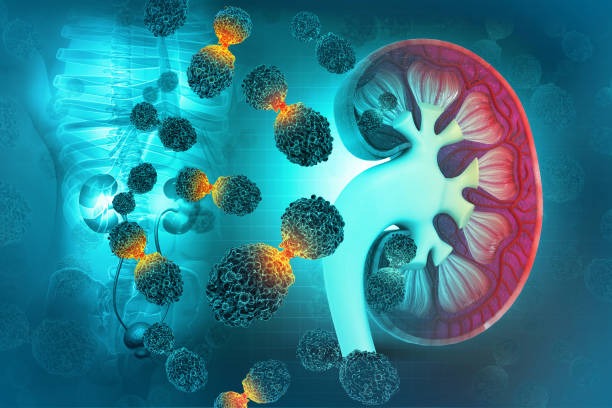Introduction:
Kidney cancer, which is also referred to as renal cancer, begins in the kidneys, which are two bean-shaped organs that filter waste from the blood and create urine. Although kidney cancer when it occurs in its early stages presents few symptoms and is amenable to surgical treatment, the cancer can become invasive and metastasize (extend) to other organs if not identified early. Identifying the major kidney cancer risk factors and metastasis can aid prevention, early detection, and improved treatment.
Principal Kidney Cancer Risk Factors
Several environmental, genetic, and lifestyle elements are responsible for kidney cancer risk. Some of the most prevalent are discussed below:
Tobacco smoking
One of the best-known kidney cancer risk factors, smoking raises the risk remarkably. Tobacco carcinogens are filtered through the kidneys, which results in a cellular injury that predisposes toward malignancy. Smokers have a nearly two-fold risk of developing kidney cancer compared to non-smokers.
Obesity
Excess body weight is also linked with hormonal alterations, particularly elevated insulin levels and persistent inflammation, which can contribute to tumor development.
High Blood Pressure (Hypertension)
Long-term high blood pressure has the potential to harm the kidneys and can cause abnormal cell growth. Research indicates a strong link between prolonged hypertension and renal cell carcinoma (the most frequent form of kidney cancer).
Family History and Genetics
Having a family member who has kidney cancer raises one’s risk level, especially if the cancer was detected early in life. Specific genetic diseases like von Hippel-Lindau (VHL) disease, Birt-Hogg-Dubé syndrome, and hereditary papillary renal carcinoma are linked directly to a higher risk of kidney cancer.
Exposure at Work
Exposure to cadmium, asbestos, benzene, and some herbicides in the workplace has been associated with an increased risk of kidney cancer.
End-Stage Renal Disease and Dialysis
End-stage renal disease patients on long-term dialysis have a higher risk of acquiring renal cancer. This is mainly because of acquired cystic kidney disease, which is a frequent complication of long-term dialysis.
Age and Gender
Kidney cancer is more prevalent in older persons, with the majority of diagnoses being made between 60 and 70 years of age. Men are almost twice as likely to get kidney cancer as women due in part to increased smoking and workplace exposure.
Understanding Kidney Cancer Metastasis Trends
Metastasis is the dissemination of cancer from its primary source (the kidney) to other locations in the body. Kidney cancer, and especially clear cell renal cell carcinoma, has a reputation for metastasizing with a vengeance if not treated.
Frequent Sites of Metastasis
Kidney cancer most frequently metastasizes to:
– Lungs: Involves the lungs in approximately 50-60% of metastatic situations.
– Bones: Often generates painful skeletal secondary effects.
– Liver: Less frequent but signifies late-stage disease.
– Brain: This is related to a poor prognosis.
– Lymph Nodes: These are early sites of metastasis.
Patterns of Spread
Metastasis in kidney cancer occurs through:
– Bloodstream: The kidneys are richly vascularized, so the cancer cells can easily enter the circulation.
– Direct invasion: The tumor can invade the adjacent organs such as the adrenal glands or renal vein.
Chronology of Spread
Kidney cancer can metastasize synchronously (at presentation) or metachronously (months or years following treatment). About 25-30% of patients have metastasis at presentation, and a further 20-30% acquire it subsequently.
Signs of Metastatic Kidney Cancer
Symptoms depending on the site of metastasis:
– Lung metastasis: Cough, shortness of breath, chest pain.
– Bone metastasis: Pain in bones, fractures.
– Liver metastasis: Jaundice, pain in the abdomen.
– Brain metastasis: Headache, seizures, neurological impairment.
Prevention and Early Detection
Although not all risk factors for kidney cancer are avoidable, many can be reduced through lifestyle modifications. Some of these are:
– Stopping smoking
– Healthy weight maintenance
– Blood pressure control
– Elimination of occupational exposure to toxic substances
– Engagement in regular physical activity
– Routine follow-up, particularly where there is a family history
New imaging modalities like ultrasound, CT, or MRI may enable early detection of the tumor, with improved prospects of cure prior to metastasis.
Treatment and Prognosis
Kidney cancer treatment varies with stage and metastasis:
– Metastatic cancer: Treated with targeted therapies (e.g., tyrosine kinase inhibitors), immunotherapy (checkpoint inhibitors), and sometimes radiation or surgery to manage metastatic locations.
– Five-year survival is extremely high (~90%) for localized kidney cancer but low to less than 15% for metastatic kidney cancer, which highlights the significance of early diagnosis.
Conclusion:
Understanding the key kidney cancer risk factors and metastasis trends is critical for early diagnosis, effective treatment, and improved outcomes. While some risk factors are beyond control, many can be addressed through lifestyle changes and regular health monitoring.
FAQs
1. What are the most common risk factors for kidney cancer?
The most prevalent risk factors are smoking, being overweight, high blood pressure, family history, toxin exposure, and chronic kidney disease.
2. Is it possible to prevent kidney cancer?
Although not every case is preventable, refraining from smoking, being at a normal weight, having normal blood pressure, and avoiding toxin exposure can greatly reduce the risk.
3. How does kidney cancer spread in the body?
It is spread through the blood, lymphatic system, or direct invasion, most commonly to the lungs, bones, liver, brain, and lymph nodes.
4. Early warning signs of kidney cancer?
Normal early symptoms are blood in urine, chronic pain in the side or lower back, unintentional weight loss, and tiredness, although many cases remain asymptomatic in the initial stages.
5. Can kidney cancer be cured once it has spread?
Although metastatic forms of kidney cancer are harder to manage, more recent targeted therapies and immunotherapies have enhanced survival and life quality for a large portion of patients.


